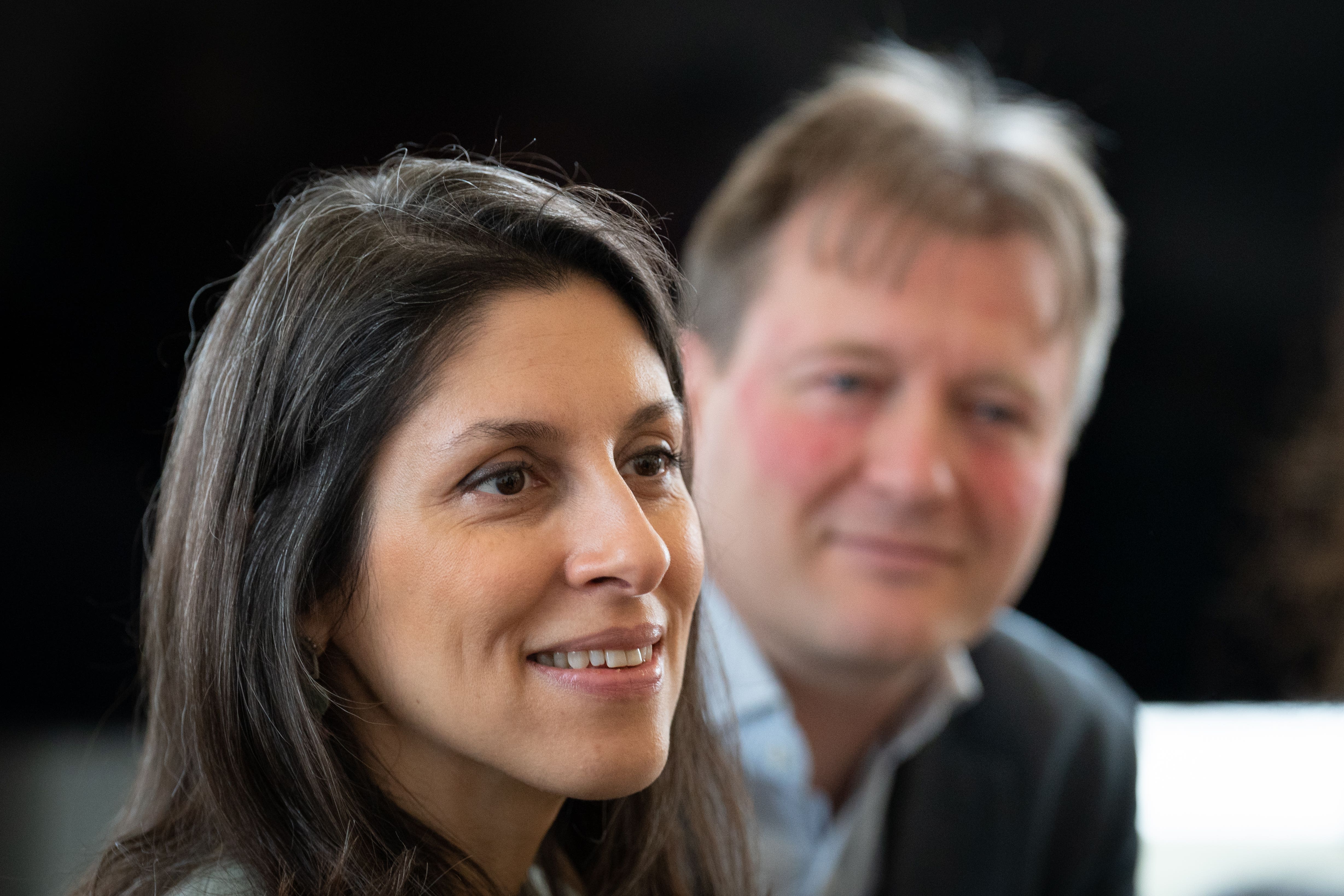Nazanin Zaghari-Ratcliffe: Readjusting to life back in the UK was ‘very hard’
Her husband Richard Ratcliffe said a recent report into the Government’s handling of hostage cases had ‘very important’ findings.

Your support helps us to tell the story
From reproductive rights to climate change to Big Tech, The Independent is on the ground when the story is developing. Whether it's investigating the financials of Elon Musk's pro-Trump PAC or producing our latest documentary, 'The A Word', which shines a light on the American women fighting for reproductive rights, we know how important it is to parse out the facts from the messaging.
At such a critical moment in US history, we need reporters on the ground. Your donation allows us to keep sending journalists to speak to both sides of the story.
The Independent is trusted by Americans across the entire political spectrum. And unlike many other quality news outlets, we choose not to lock Americans out of our reporting and analysis with paywalls. We believe quality journalism should be available to everyone, paid for by those who can afford it.
Your support makes all the difference.Nazanin Zaghari-Ratcliffe has said readjusting to life back in the UK after six years imprisoned in Iran was “very hard” and “a lot slower” than she expected as her story was kept “fresh on a daily basis” by Iranian unrest.
Speaking at Glastonbury Festival, where she joined a talk about Iranian women’s rights on Friday afternoon, Ms Zaghari-Ratcliffe discussed the impact of seeing civil unrest and protests in Iran, centred around the death of 22-year-old Mahsa Amini in September 2022 while in police custody for wearing her hijab too loosely.
Her husband Richard Ratcliffe also commented on a damning new report on the Foreign Office’s handling of hostage diplomacy, including how the department managed his wife’s case, saying it had a lot of “very important” findings as he criticised the Government’s “head-in-the-sand” approach.
I can't complain - I'm free and I'm out, whereas many of my friends are still in prison
Asked what it has been like readjusting to life in the UK since her release in March 2022, Ms Zaghari-Ratcliffe told the PA news agency: “A lot slower than what I thought it would be.
“Just because early on when I was released, the uprising in Iran happened… since then I went through stories of many other people who were arrested, and then their stories came out.
“I resonated very much with what they have gone through.
“My story was all of a sudden so fresh on a daily basis and I couldn’t get myself out of it – it was very hard.
“So I think settling down was a lot more complicated and difficult than what I was expecting because of what is happening.
“But you know I can’t complain – I’m free and I’m out, whereas many of my friends are still in prison.”
During the talk on Friday at the Left Field tent on Worthy Farm, Ms Zaghari-Ratcliffe said the first names of eight friends she made in prison who she is still campaigning to help free: Nilufar, Sepideh, Mahvash, Fariba, Morad, Siamak, Emaad and Nargess.
Ms Zaghari-Ratcliffe said she feels the continued unrest in Iran is no longer getting the attention it deserves from the media and from governments outside of the country.
“I think when this whole uprising happened back in September 2022, there was a lot of momentum, but then, of course, the world moves on,” she said.
“Like I said in the talk, I think the West is trying to negotiate a deal with Iran, so backing up any protests at this stage will be, frankly, stopping the procedure.”
A report by MPs in April on the Government’s handling of hostage diplomacy condemned its handling of cases such as Ms Zaghari-Ratcliffe’s and that of British-Iranian dual national Anoosheh Ashoori.
Speaking about the report, Mr Ratcliffe told PA: “There were a lot of things that I thought were really important.
“It talks about needing better structures… (having) a person who’s in charge of hostage cases that all families can turn to and all bits of Government can turn to.
“In our case, it was clear that needed to be done for us… but (instead) it was a fight between the Foreign Office, the Ministry of Defence and the Treasury – we got caught between different silos.”
Mr Ratcliffe said they are awaiting the Government’s response, which he said is “now late” but they are hoping will come next week.
He added: “It was a critical report. Are they accepting it? And are they changing? At this point, we don’t know.”
Mr Ratcliffe said the Government needs to end its “head-in-the-sand” approach.
“At the moment, cases like that Nazanin’s are reasonably rare… but they’re growing, and that growth is something that the Government is not really dealing with,” he said.
“The head-in-the-sand ‘let’s hope we keep this at a low level’ and manage it like you would with a really rare illness – it doesn’t work.
“There are a number of countries who are taking hostages, there aren’t many that that make the media, there aren’t many that the government will acknowledge as hostages or even acknowledge as arbitrarily detained.
“We’ll await to see whether the government says ‘yes, hands up, we need to get better’ or whether what we get is a ‘we’ll carry on what we’re currently doing but we’ll tweak around the edges’.
“I’ve had both in my time… so let’s see what comes.”
Subscribe to Independent Premium to bookmark this article
Want to bookmark your favourite articles and stories to read or reference later? Start your Independent Premium subscription today.